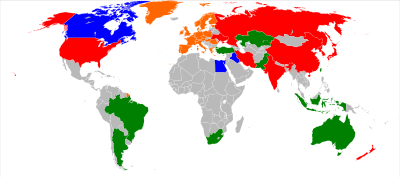
Back Liste des pays lanceurs de satellites French Data del primo lancio orbitale di ogni nazione Italian 各国初の軌道投入の年表 Japanese 나라별 최초의 우주발사체 Korean Lista pierwszych startów orbitalnych według państw Polish Хронология первых космических запусков по странам Russian Список перших запусків космічних супутників власними ракетами-носіями за країною Ukrainian 各国首次自主进行入轨发射任务时间表 Chinese

This is a timeline of first orbital launches by country. While a number of countries, incl. Canada, Australia, Germany, Brazil, Algeria, Kazakhstan, Turkey, Argentina, Italy, Malaysia, Poland, South Africa, the Philippines, Egypt, Spain, Mexico, Thailand and Chile, have built or launched satellites, as of 2022, eleven countries, incl. the United States, Japan, China, India, Iran, Israel, France, the United Kingdom and South Korea, have had the capability to send objects into orbit with their own launch vehicles. Russia and Ukraine inherited the capability of the space launchers and satellites from the Soviet Union, following its dissolution in 1991. Russia launches its rockets from its own and foreign (Kazakh) spaceports.
Ukraine launched only from foreign (Kazakh and Russian) launch facilities until 2015, after which political differences with Russia effectively halted Ukraine's ability to produce orbital rockets.[1][2] France became a space power independently, launching a payload into orbit from Algeria, before joining space launcher facilities in the multi-national Ariane project. The United Kingdom became a space power independently following a single payload insertion into orbit from Australia.
Ten countries and one inter-governmental organisation (ESA) have a proven orbital launch capability, as of November 2021[update].[a] Three countries (France, Italy[3] and the United Kingdom) formerly had such an independent capability. In all cases where a country has conducted independent human spaceflights (as of 2021, three — China, the Soviet Union/Russia, and the United States), these launches were preceded by independent uncrewed launch capability.
The race to launch the first satellite was closely contested by the Soviet Union and the United States, and was the beginning of the Space Race. The launching of satellites, while still contributing to national prestige, is a significant economic activity as well, with public and private rocket systems competing for launches, using cost and reliability as selling points.

- ^ "Zenit successfully launches on likely swansong with Elektro-L - NASASpaceFlight.com". Nasaspaceflight.com. 11 December 2015. Retrieved 9 August 2017.
- ^ "Dnipro will not let Ukraine's space glory be forgotten". Euromaidan Press. 10 January 2017. Retrieved 9 August 2017.
- ^ "Italy in Space" (PDF). ESA. Retrieved November 18, 2022.
Cite error: There are <ref group=lower-alpha> tags or {{efn}} templates on this page, but the references will not show without a {{reflist|group=lower-alpha}} template or {{notelist}} template (see the help page).